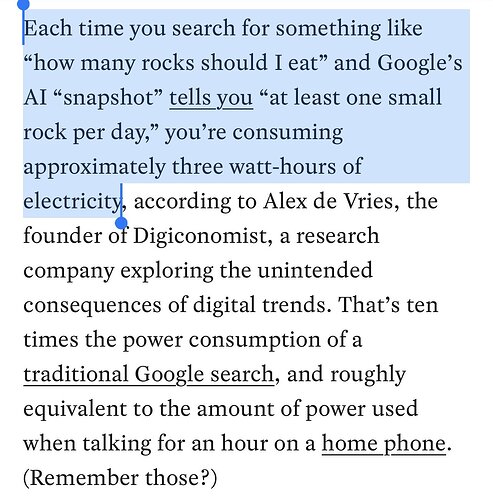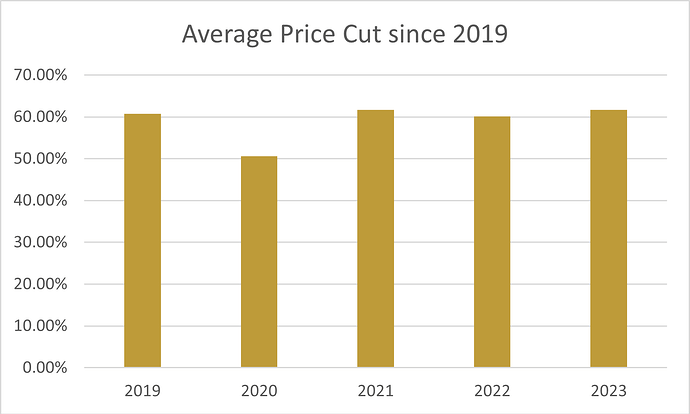I just got another repeating audio glitch. I heard the phrase “it’s vibes all the way down” at least 3 times in a row on NPR’s 1A program. For reasons I’d rather not get into rn, I have a hunch it’s AI related. But I mean 1A, AI. It’s just fucking with us at this point.
I got bad news for you about some people needing bourbon to live.
I’m confused what you mean here. Are you trying to have the NIH take credit for all researchers work if they started with an NIH grant?
Public funding of biological research via NIH is how real progress is made. Phds at universities and research hospitals can do the kind of fundamental research that for-profit companies would never dig into because it’s so many steps away from a profitable endpoint.
And there’s so much still unknown about biology it’s ridiculous. It’s a shame we’re not investing 10x more into NIH. I know if we poured money into biotech research the way we pour money into defense we would unlock immortality. The pieces are all there
I was hoping joe biden would pump this funding up, he said he wanted a moonshot to cure cancer, i guess that was just an empty campaign promise. I talked to a couple researchers who said they had better/more funding during the george w bush years
“while the digital currency nobody asked for is slurping up the power grid to mine bitcoins”
doesn’t go viral
Presumably if no one wanted ChatGPT they wouldn’t use it and it wouldn’t use much energy?
27 GLP-1 drugs in trials.
Going to be some real price competition.
I guess it was only a matter of time before drugs like this were discovered and become mainstream given how many people, at least in America, are overweight, but for some reason this all feels very sudden and I feel like I should be skeptical of it.
Is everyone just going to be on weight loss drugs now? That feels weird
Seems like it’s going to become just like Botox.
It will be nothing like Botox. And it’s not just a US issue, it’s worldwide. The latest big study is from China, which has the greatest number of obease people (cause large population obviously). Obesity is endemic to society now that humanity is able to produce a large surplus of calories at low cost.
Botox is a niche drug for rich people to alter their looks a bit. These drugs may raise average life expectancy by 5 years, as well as life quality (eg less dialysis and heart attacks) and will have broad humanity-wide social and cultural effects. I’d say they are more like TV or the Internet or antibiotics than Botox.
Probably more like cholesterol drugs.
Speaking of China, how does the CCP handle negotiation with the Pharma industry?
BUT…
- Preferential treatment is specifically developed for innovative drugs.
During the 2023 NRDL adjustment, a total of 25 innovative drugs (including Class 1 chemical drugs, Class 1 therapeutic biological products, and Class 1 and Class 3 traditional Chinese medicines according to the current drug registration management measures and classification standards) participated in the negotiations. Among them, 23 products were included in the final list, achieving a 92% success rate, which is 7.4% higher than the list’s overall success rate of 84.6%, and an average price cut of 57.3%, which is 4.4% lower than the list’s overall price cut rate of 61.7%.
From a policy perspective, the NHSA is committed to supporting the development of the innovation-based drug industry, and to gradually build up support for innovative drugs to be included in the NRDL. Specifically, the NHSA has implemented the following measures:
a) Grant priority access for innovative drugs. During the expert review stage, the NHSA actively instructed experts to focus on the evaluation of the candidate drugs’ innovation and clinical value. If such drugs meet the access criteria, they will pass the preliminary review automatically.
b) Amend the simple renewal mechanism for innovative drugs, with an option for renegotiation. The NHSA further amended the rules for simple renewal in 2023 (for more details about the 2022 simple renewal mechanism, please see our previous issue), granting pharmaceutical companies the option to apply for a renegotiation if the price reduction rate based on the simple renewal mechanism is not satisfactory. The price reduction rate achieved in renegotiation may be less than the one calculated using the simple renewal mechanism. These amended renewal rules enable innovative drugs with high clinical value to be renewed at more reasonable prices, thereby increasing benefits to patients and promoting growth in innovative drug revenue.
According to the 2023 NRDL, about 70% of the 100 drugs were renewed at their original prices. Thirty-one drugs were renewed at reduced prices because they exceeded the expected sales volume, with an average price cut of 6.7%. Meanwhile, 17 drugs adding new indications were renewed at their original prices.
c) Establish an annual revision practice and expand the pool of drugs eligible for NRDL. The NHSA has shortened the revision cycle for new drug inclusion from a maximum of eight years to one year. This means innovative drugs may be included in the NRDL much more quickly. Additionally, the application for inclusion no longer depends only on experts’ recommendations; now, it also considers pharmaceutical companies’ own applications, and all new drugs NMPA-approved for market authorization within the past five years are allowed to participate in the application. All of these measures accelerate the timeline for inclusion of innovative products in the NRDL.
In the 2023 NRDL, 57 drugs were approved for market authorization and included in the NRDL within the same year, and the drugs approved within the past five years constituted 97.6% of the newly added drugs in the 2023 NRDL, much higher than 32%, the 2019 figure.
d) Introduce price confidentiality mechanism to support global expansion of domestic innovative products. Domestic innovative pharmaceutical companies have voiced concerns that subsequent to NRDL negotiations their products hit global low prices, and the disclosure of such prices is detrimental to their global expansion efforts. This is particularly true for domestic companies with innovative drug portfolios that typically launch their products in China before going to market in other countries.
To address this concern, the NHSA factored potential international impact into its practice and implemented a price confidentiality measure for certain drugs in the 2023 NRDL revision. The measure allows the final negotiated drug price to be omitted and replaced with an asterisk, as mentioned in Section 2.
China has passed on a few oncology products like CAR-T therapies due to current price, and negotiated for an older insulin product at a big discount then used that to get a discount on later generation products
That’s absolutely fucking insane.
It certainly adds up to a lot, but 3 watt-hours is still a pretty small amount of energy. An average American household uses about 30000 watt-hours per day.
The insane part is the fact that’s it’s using 10x the amount of energy that a regular search uses, while providing no real benefit. Another way to look at it, if my quuck back of napkin math is correct, is that it uses enough energy to move a Tesla about 60 feet.
Any takes on this?
This was in response to “it’s not obvious that a public system would save more lives than private”
But could equally be in response to “it’s hard to measure this stuff”
There’s absolutely no way that a system where 5 companies alone spend 248.1 billion on research and almost zero on malaria is saving more lives
That’s 500 times the global spend on malaria, that 600 million is almost all government funded
Sure. There’s accounting issues at the margins, but this is something which speaks for itself.
Closer to home. People are dying in the US because they can’t afford insulin. Again. This speaks for itself.


